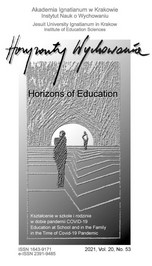Kategoria osoby jako punkt krytyczny rozważań nad wychowaniem. Inspiracje z nurtu personalizmu chrześcijańskiego
The Category of a Person as a Critical Point in Considering the Process of Upbringing. Inspirations from the Christian Personalism
Author(s): Beata BednarczukSubject(s): Christian Theology and Religion, Developmental Psychology, Personality Psychology, Behaviorism, Pedagogy
Published by: Uniwersytet Ignatianum w Krakowie
Keywords: personalistic concept of man; features of personalistic process of upbringing;
Summary/Abstract: RESEARCH OBJECTIVE: This article aims to recall the constitutive criteria of the personalistic conception of a person as critical points in considerations on upbringing and to find and indicate inspiration and, consequently, recommendations for the upbringing process. THE RESEARCH PROBLEM AND METHODS: The basis for collecting empirical material is the analysis of the content, which aims to characterize the achievements within the selected topic and directions of discussions. It is accompanied by elements of interpretation and conceptualization. The conduct of the researcher is guided by methodological rules related to the need to ensure the verifiability, credibility, and cognitive value of the work results THE PROCESS OF ARGUMENTATION: Referring to the assumptions of the representatives of Christian personalism, the method of interpreting the qualities of a person who achieves full development and his own existence by acting for the benefit of others and among other people was indicated. It was emphasized that the dignity of the human person is the basis of moral duty and that unconditional respect for dignity allows for treating the process of upbringing as a service for human development. The educator has to have a mature system of values and organize situations that help to recognize them. The choice of value is decisive in the process of becoming a person (or anti-person). Learning and practicing values takes place through a meeting/relationship. RESEARCH RESULTS: Transferring the assumptions of personalism to the pedagogical ground results in the assumption that human is the program of education. Man is characterized by specific personal qualities, predispositions towards development, and upbringing creates conditions for revealing and developing the aforementioned potentials in dialogue and interaction with others. The core principle of building mutual relations is love. CONCLUSIONS, INNOVATIONS, AND RECOMMENDATIONS: Since a person is the highest value, he/she becomes per se, his/her goal is to perfect himself. In carrying out this lifelong work, he/she is supported by the upbringing process. While upbringing in a modern school usually boils down to adapting to the existing structures and institutional models of life, from the perspective of personalism, it is the help given to a person in finding their potential and values around them, thanks to which he/she will be able to participate in the process of building and developing himself.
Journal: Horyzonty Wychowania
- Issue Year: 19/2020
- Issue No: 50
- Page Range: 117-130
- Page Count: 14
- Language: Polish

